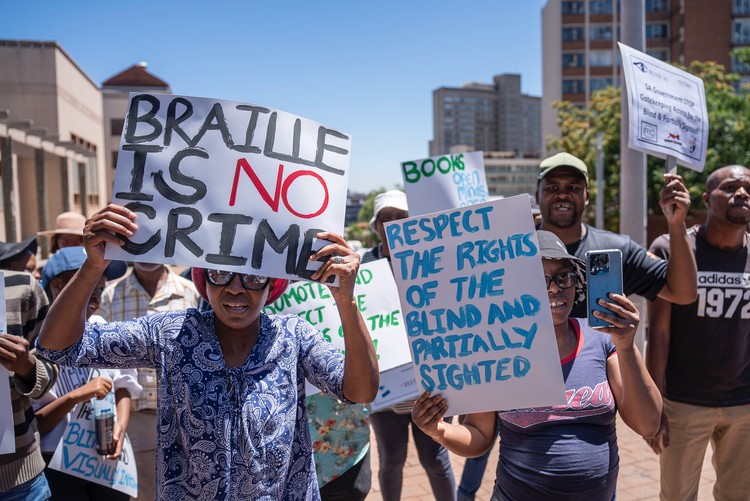End book famine for blind people, demand protesters
Blind SA and other organisations picket outside the Constitutional Court
“Braille is no crime” read a poster held by a protester outside the Constitutional Court where lawyers for Blind SA were requesting that a court-crafted copyright exception for braille and other accessible formats be extended. Photo: Ihsaan Haffejee.
Blind SA led a picket outside the Constitutional Court on Thursday. Inside, the court was considering a matter relating to copyright in South Africa that affects the rights of blind people to convert copyright protected works into accessible formats.
Protesters held up posters reading: “Braille is not a crime” and “End the book famine”.
“The essence is that there really should be equal access to books,” said Pearl Nicodemus from SECTION27.
In 2022, the Constitutional Court ruled that certain sections of the current Copyright Act are unconstitutional because they deny blind people the ability to convert books without the consent of the copyright holder to formats like braille and audio.
The court ordered Parliament to amend the Act by 21 September 2024 to allow for this. In the interim, the court crafted its own exception for people who are visually impaired and had it read immediately into the Copyright Act, awaiting Parliament to amend the Act.
But the Copyright Amendment Bill, which would address the unconstitutional elements of the current Copyright Act, although approved by Parliament in February and sent to President Ramaphosa, has not been signed into law. As a result, the court-crafted exception has now lapsed.
“We are here to demand our rights as blind and partially sighted people of South Africa. We want the judges to do what is right as they did two years ago,” said Ofentse Manyane, head of braille printing at Blind SA.
“Being blind does not mean we are second class citizens. We just want the right to read books like every other person who has that right,” said Manyane.
Inside the court, lawyers from SECTION27, acting for Blind SA, were requesting that the court-crafted exception be resuscitated until the President signs the Copyright Amendment Bill. This would then allow for the continued legal production of material in accessible formats for blind and visually impaired people.
“Because of the President’s failure to sign the bill there is now a gap in the law, so we are hoping that the court resuscitates this exception that allowed us to convert books legally. Reading cannot be criminalised,” said Manyane.
Blind SA was not opposed except by the President on the matter of court costs.
The Constitutional Court reserved judgment.
GroundUp will write a report explaining the judgment when it is handed down.
Support independent journalism
Donate using Payfast

Don't miss out on the latest news
We respect your privacy, and promise we won't spam you.
Next: Last minute reprieve for Zimbabwe Exemption Permit holders
Previous: Tariffs on Shein and Temu: cheaper clothes versus saving jobs
© 2024 GroundUp. This article is licensed under a Creative Commons Attribution-NoDerivatives 4.0 International License.
You may republish this article, so long as you credit the authors and GroundUp, and do not change the text. Please include a link back to the original article.
We put an invisible pixel in the article so that we can count traffic to republishers. All analytics tools are solely on our servers. We do not give our logs to any third party. Logs are deleted after two weeks. We do not use any IP address identifying information except to count regional traffic. We are solely interested in counting hits, not tracking users. If you republish, please do not delete the invisible pixel.

